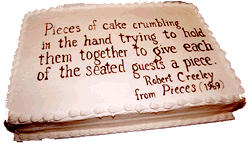 |
Creeley at 70 in Buffalo a review by Loss Pequeño Glazier |
 |
Creeley at 70 in Buffalo a review by Loss Pequeño Glazier |
DATELINE BUFFALO. October 10th-12th, 1996.
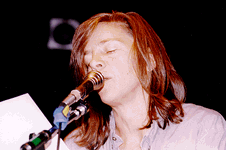 First night: Eileen Myles, introduced by Creeley, kicks off the
70th birthday celebration in honor of Robert Creeley
reading to a packed
crowd in the large Hallwall's performance space, with its stage
bordered on three sides by the audience. Her figure animated against
the somewhat large stage, reading and letting each page of text drift
to the floor after reading it. Voice, presence, narrative rang solidly
to a thoroughly enthusiastic crowd.
First night: Eileen Myles, introduced by Creeley, kicks off the
70th birthday celebration in honor of Robert Creeley
reading to a packed
crowd in the large Hallwall's performance space, with its stage
bordered on three sides by the audience. Her figure animated against
the somewhat large stage, reading and letting each page of text drift
to the floor after reading it. Voice, presence, narrative rang solidly
to a thoroughly enthusiastic crowd.
|
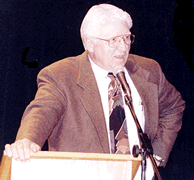 Second day: the formal opening of activities by
William Greiner, UB president and Creeley colleague who first met
Creeley long-distance while Creeley was in Finland. Then, Gil
Sorrentino, fondly introduced by Joseph Conte, reading in the
Katherine Cornell Theatre, a good-sized semi-formal spaceship
architecture palace space on the edge of Buffalo's tundra-tinged north
campus.
Second day: the formal opening of activities by
William Greiner, UB president and Creeley colleague who first met
Creeley long-distance while Creeley was in Finland. Then, Gil
Sorrentino, fondly introduced by Joseph Conte, reading in the
Katherine Cornell Theatre, a good-sized semi-formal spaceship
architecture palace space on the edge of Buffalo's tundra-tinged north
campus.
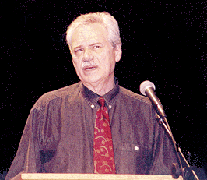 Sorrentino read prose from a new piece (I think forthcoming in
Conjunctions). A richly written piece, supercharged with irony,
purposely laden with the banalities of the wife-swapping
(cunt-swapping more accurately by the words of its narrator)
personalities it characterized and the revolting misogyny and sexual
beasty balls of its less-than-likable narrator. Above this content,
the precision of Sorrentino's prose glimmered like a city
skyline. Amiri Baraka, originally scheduled to read with Sorrentino,
was unable to appear.
Sorrentino read prose from a new piece (I think forthcoming in
Conjunctions). A richly written piece, supercharged with irony,
purposely laden with the banalities of the wife-swapping
(cunt-swapping more accurately by the words of its narrator)
personalities it characterized and the revolting misogyny and sexual
beasty balls of its less-than-likable narrator. Above this content,
the precision of Sorrentino's prose glimmered like a city
skyline. Amiri Baraka, originally scheduled to read with Sorrentino,
was unable to appear. Creeley therefore gave a preview mini-reading,
talking briefly and reading the full text of his The Dogs of Auckland
(approximate title) chapbook forthcoming from Meow Press. A gorgeous
piece of work. Creeley therefore gave a preview mini-reading,
talking briefly and reading the full text of his The Dogs of Auckland
(approximate title) chapbook forthcoming from Meow Press. A gorgeous
piece of work. This reading was followed by a reception in the poetry collection and its great assembly of rare, beautiful, and ephemeral Creeley materials and also a retrospective (mostly small press) of poetry chez Buffalo for the past 50 years. A delirious spread of rare and richly-diverse print artifacts that gave a varied sense of the "scene" as passing in and out and back into the "city of no illusions". Back at Katherine Cornell, next up was the Creeley-Dine event, the room full to the rafters. (So packed the fire marshall was threatening to turn back poetry-goers if they could not prove they had a seat.)
Next Dine was
introduced excellently by Charles Bernstein followed by the Creeley-Dine
conversation. Truly extraordinary, to hear these two men talk
about a range of subjects near and dear to both art and writing,
"tools" of any trade, age and its perspectives, perseverance
and its perspectives, the necessities of incessant travel and,
well, all in all, what it means to hang in there. This was a primo
opportunity to hear both the writer and the artist talk.
|
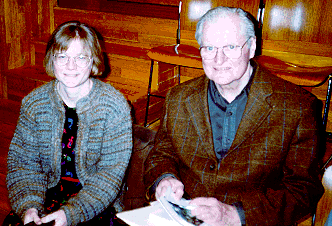 DAY 3. Back in the Katherine Cornell theatre, Susan Schultz could
have had no more style, zest, and presence than in her introduction
of John Ashbery in which she first met a man who called himself
Ashbery (Bernstein) and in which she recounted her pilgrimage
to the Ashbery family apple farm not far from the site of the
present event. Ashbery's reading was first-rate. Ashbery, a poet
who will soon be the same age as the man who this gathering celebrated,
performed fully in command of his craft, reading from his latest
book as well as from new poems. Ashbery's reading was followed
by a reception across the hall where poetrygoers were able to
congregate and compare notes at the penultimate chime of this
poetry celebration's verse-bent clock.
DAY 3. Back in the Katherine Cornell theatre, Susan Schultz could
have had no more style, zest, and presence than in her introduction
of John Ashbery in which she first met a man who called himself
Ashbery (Bernstein) and in which she recounted her pilgrimage
to the Ashbery family apple farm not far from the site of the
present event. Ashbery's reading was first-rate. Ashbery, a poet
who will soon be the same age as the man who this gathering celebrated,
performed fully in command of his craft, reading from his latest
book as well as from new poems. Ashbery's reading was followed
by a reception across the hall where poetrygoers were able to
congregate and compare notes at the penultimate chime of this
poetry celebration's verse-bent clock.
 What could top things so far? The finale of course! The night
of day three, Hallwall's Jazz concert with Steve Kuhn and Carol
Fredette. Perhaps the most decked out I've seen Hallwall's with
not only great book tables (thanks to Talking Leaves) but also,
inside, two food tables, one with the cheeses, meats, breads,
and grapes, and the other buckling under the weight of the two
enormous cakes
What could top things so far? The finale of course! The night
of day three, Hallwall's Jazz concert with Steve Kuhn and Carol
Fredette. Perhaps the most decked out I've seen Hallwall's with
not only great book tables (thanks to Talking Leaves) but also,
inside, two food tables, one with the cheeses, meats, breads,
and grapes, and the other buckling under the weight of the two
enormous cakes
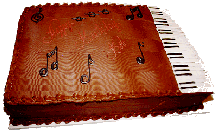 (one chocolate, one yellow) specially lettered
for such a day. Inside, Kuhn and Fredette got going. Standards
sprinkled among renditions of takes from the Steve Swallow release
Home (ECM Records 1160) on which Sheila Jordan did the
vocals. The piano's tones, registers, chordal thunderwalls in
boots soled with celestial dust-while Fredette's scats were nourished
by dizzying drops into the deep, mellow, honey-coated lower register
of her extraordinary voice. Many numbers to stun the crowd ("She
Was Young" and "Ice Cream" among the memorable
takes) and many numbers lifted like toasts to the music ship's
first mate seated with a grin and pensive attentiveness front
row center. One of the outstanding moments was Kuhn's solo improvisation
dedicated to Creeley. No piano has ever been explored, imploded,
stretched into silver multi-vocaled strands, rode into a thundered,
multi-leveled, multi-chromatic union with the absolute possibilities
of sound.
(one chocolate, one yellow) specially lettered
for such a day. Inside, Kuhn and Fredette got going. Standards
sprinkled among renditions of takes from the Steve Swallow release
Home (ECM Records 1160) on which Sheila Jordan did the
vocals. The piano's tones, registers, chordal thunderwalls in
boots soled with celestial dust-while Fredette's scats were nourished
by dizzying drops into the deep, mellow, honey-coated lower register
of her extraordinary voice. Many numbers to stun the crowd ("She
Was Young" and "Ice Cream" among the memorable
takes) and many numbers lifted like toasts to the music ship's
first mate seated with a grin and pensive attentiveness front
row center. One of the outstanding moments was Kuhn's solo improvisation
dedicated to Creeley. No piano has ever been explored, imploded,
stretched into silver multi-vocaled strands, rode into a thundered,
multi-leveled, multi-chromatic union with the absolute possibilities
of sound.
As the program was originally envisioned, Mercury Rev would've been next on stage. They had canceled so, really, it would've been over now. But seated behind me in the second row, humming audibly to some of the standards was the man who would do the finale for this 70th, Amiri Baraka, introduced with incredible acumen by Bill Fischer.
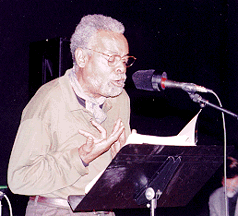 Baraka could've no less stormed the stage than if he had been
backed by the John Coltrane quartet itself. Baraka's small build
gives one no preparation for the immense vision, rhythm, voicing,
and cadences that will emerge from the flaming words of his performance.
Invoking as central to the Yugen of Baraka's earlier years,
"the big three" of the magazine, Ginsberg (is that right?),
big Charlie Olson, and Bob Creeley. (Sorrentino, by the way, also
appeared in Yugen.) Baraka paid homage to Creeley then
performed from Transbluecency and his more recent Funk
Lore (Los Angeles: Littoral Books, 1996). Baraka's humming,
chanting, and vocal renditions of the standards-a la-Baraka were
in perfect accord with the chords still lingering, clinging to
the packed, overflowing theatre. No printed text can do this!
People filling all seats, people on all sides, standing, squatting,
spilling out into the Hallwalls' hallway. Blues, transblues, transvoicings,
the unbelievable coup d'états of Baraka's "lowcoups"
(African American version of that knock-out blast commonly associated
with the haiku), and his closing triumph (slaves, dig, we were
once slaves). Indeed, it was about people, what we are,
the rhythms that vibrate through one and the same. Amiri brought
it home. And home we were-at least so is Buffalo in many senses.
Oh, for a home like this. Happy birthday celebration, Robert Creeley!
Baraka could've no less stormed the stage than if he had been
backed by the John Coltrane quartet itself. Baraka's small build
gives one no preparation for the immense vision, rhythm, voicing,
and cadences that will emerge from the flaming words of his performance.
Invoking as central to the Yugen of Baraka's earlier years,
"the big three" of the magazine, Ginsberg (is that right?),
big Charlie Olson, and Bob Creeley. (Sorrentino, by the way, also
appeared in Yugen.) Baraka paid homage to Creeley then
performed from Transbluecency and his more recent Funk
Lore (Los Angeles: Littoral Books, 1996). Baraka's humming,
chanting, and vocal renditions of the standards-a la-Baraka were
in perfect accord with the chords still lingering, clinging to
the packed, overflowing theatre. No printed text can do this!
People filling all seats, people on all sides, standing, squatting,
spilling out into the Hallwalls' hallway. Blues, transblues, transvoicings,
the unbelievable coup d'états of Baraka's "lowcoups"
(African American version of that knock-out blast commonly associated
with the haiku), and his closing triumph (slaves, dig, we were
once slaves). Indeed, it was about people, what we are,
the rhythms that vibrate through one and the same. Amiri brought
it home. And home we were-at least so is Buffalo in many senses.
Oh, for a home like this. Happy birthday celebration, Robert Creeley!
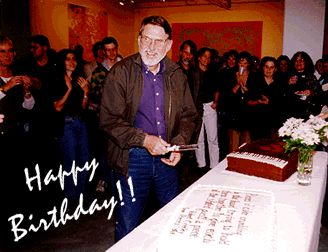 |
Review and photos: Loss Pequeño Glazier Design: ejr |